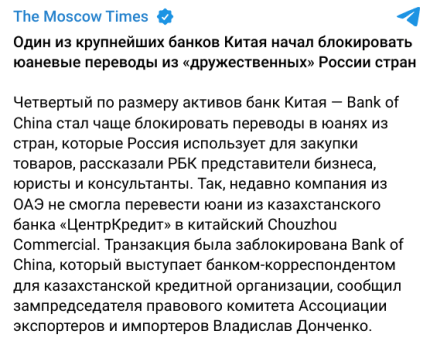One of the largest Chinese banks — Bank of China — began increasingly to block transfers in yuan from countries that the Russian Federation uses to purchase goods.
Points of attention
- The pressure of the international community on the People's Republic of China is manifested in the excessive caution of the Bank of China.
- This can complicate financial transactions between countries.
- Russian businessmen and experts are discussing the possible consequences of blocking Bank of China transfers for economic relations with partner countries.
Western pressure on China still works
Such data were shared by representatives of Russian business, lawyers and consultants who spoke on condition of anonymity.
For example, it became known that a company from the UAE failed to transfer yuan from the Kazakh bank "CenterCredit" to the Chinese Chouzhou Commercial.
The transaction was blocked by the Bank of China, which acts as a correspondent bank for the Kazakh credit organization, said Vladyslav Donchenko, deputy head of the legal committee of the Association of Exporters and Importers.
It is also important to understand that neither the director nor the founder of the company had formal ties with the aggressor country.
Journalists also managed to find out that the Chouzhou bank now asks to pay it from Kazakhstan only from those banks with which it has direct correspondent relations.
Identical problems were recorded during the transfer of funds from banks in Georgia and Armenia to the People's Republic of China.

In Russia, they explain the Chinese bank's decision in their own way
The Secretary of the General Council of the Russian-Asian Union of Industrialists and Entrepreneurs Maksym Spassky responded promptly to the latest events.
According to him, Bank of China has the most serious and complex compliance among Chinese banks.
Only some suspicion of danger — they do not want to make the payment right away, — added Spassky.
He also added that "for non-serious goods, payments are made to small regional banks."
However, when it comes to the supply of complex equipment or electronics, and the payer is a company from the UAE, Kyrgyzstan, or Kazakhstan, "all the cards come together."




